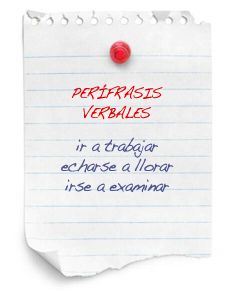#43: - Weekly perífrasis verbales: Practice Exercise: Comenzar + a + infinitivo
43: - Weekly perífrasis verbales: Practice Exercise: Comenzar + a + infinitivo
comenzar a infinitvo -> to begin to do something

comenzar + a + infinitivo
Examples/Ejemplos
Comenzar + a + infinitvo
Su hijo comenzó a andar a los nueve meses de edad.
Her son started to walk at nine months of age.
++++++++++++++++++++++++++++++++++++++++++++++++++
A ‘perífrasis verbal’ is a structure with a helping verb plus an ‘infinitivo’ or a ‘gerundio’ (verb that ends in ar, er, ir).
More info on perifrasis verbales: a helpful link
Good link to explain perifrases verbales: great link by another SD contributor
Let’s practice a few of these in simple sentences. Here are the rules:
1.One sentence per post.
2.Use the ‘perífrasis verbal’ for this week in a sentence in Spanish. Then write it in English.
3.You may post one image to illustrate your sentence.
SilviaC will be the corrector for the Spanish. I will help out on the English. SilviaC ++++++++++++++++++++++++++++++++++++++++++++++++++++++
Una “perífrasis verbal” tiene una estructura con un verbo auxiliar y un “infinitivo” o “gerundio”.
Vamos a practicar un poco estas estructuras en oraciones simples. Estas son las reglas:
1.Una oración por respuesta
2.Usa la perífrasis verbal escogida para esta semana y escribe una oración con ella en español y en inglés.
3.Puedes usar una imagen para ilustrar tu respuesta.
SilviaC será la correctora de español. Yo ayudaré con el inglés.
New link I've found recently: new link with additional info *If you missed last week's practice here is the link: No. 42 - agarrar y hacer
11 Answers
Comenzó a pescar de nuevo después de un frío invierno
I started to go fishing again, after a very cold winter.
Tengo que comenzar a hacer estos ejercicios de nuevo!
I have to start doing these exercises again!
¡Han comenzado a entrenar para los Juegos Olímpicos!
They have begun to train for the Olympics!

El mes próximo él comenzará a trabajar.
El mes próximo él va a comenzar a trabajar.
Next month he will begin to work.

For the hundredth time I will begin dieting.
Por centésima el cien vez comenzaré a hacer dieta.
El bebé comenzaría comenzaba a gatear, pero no sabía como seguir.
The baby would start to crawl, but didn't know how to keep going.

Todos habíamos alcanzado la cima cuando comenzó a llover.
We had reached the top when it started to rain.

Comenzaste a decirme algo anoche, pero fuimos interrumpidos. ¿Qué quisiste decir?
You started to tell me something last night, but we were interrupted. What did you want to say?
Bumping this one up to remind everyone to do corrections if you haven't already.

Comenzó a llover, lleva un paraguas.
It's beginning to rain, take an umbrella.

Está comenzando a mirar mucho como navidad.
It's beginning to look a lot like Christmas.











